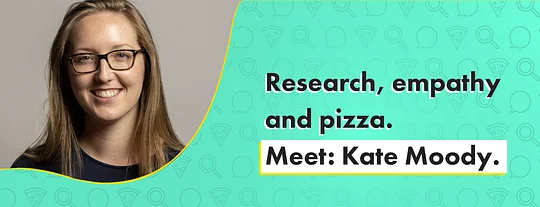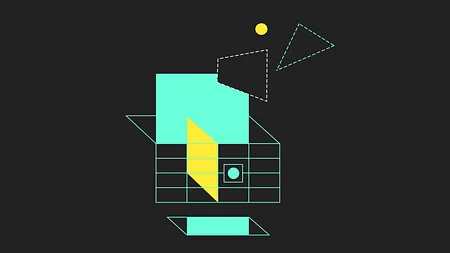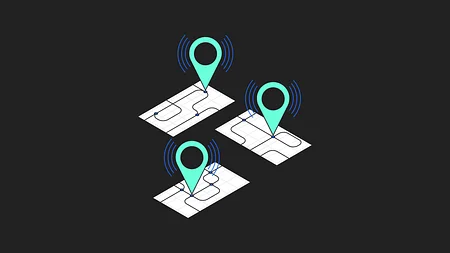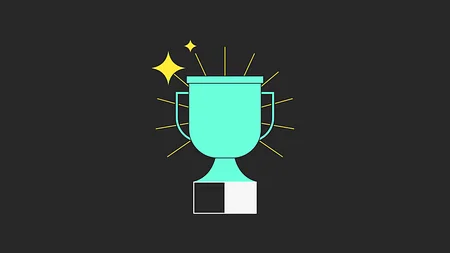Research, empathy and pizza. Kate Moody

Sharing our stories, our challenges, and the things that truly matter to us. Today we talk to Kate Moody from the 11:FS Consulting team to discuss researching digital services, spreadsheets and understanding cultural nuances.
In a world of increasing customer choice, how can banks find a way to design a proposition that stands out from the crowd? And how can you determine if anyone would use a service before it’s live?
11:FS has a team of outstanding researchers delivering fascinating insights into how consumers think about money, financial planning and more, to help answer those questions. Using the Jobs to be Done (JTBD) framework, the research team within Consulting has helped shape propositions all over the world and bring new digital services to market.
Kate Moody has been involved in much of that, focusing on customer frustrations and their desired outcomes.
As a Senior Customer and Product Lead she has interviewed consumers on topics, ranging from financial management worries to how US banks are serving their small business customers.
She’s travelled within Africa, delving into different cultures to truly understand the important nuances of each local market, and most recently has been analysing attitudes towards money and digital services in the Middle East.
Hi Kate! In our now honoured tradition, we’ll start with an ‘easy’ one. How do you explain to your family what you do?
I help build new services that are designed to make people’s financial lives easier. I speak to people to work out what’s broken right now and what we might do to fix that.
A stranger just asked you to describe 11:FS in one sentence...you say:
Smart pragmatists trying to evolve financial services for the better.
What do you consider to be the most important thing you’ve learnt since joining 11:FS?
Spreadsheets make the world go round. They underpin so many financial hacks that people and businesses currently have to put in place to structure their finances in a way that makes sense to them.
Never underestimate the spreadsheet.
I get a genuine buzz out of helping our clients build real empathy with their customers.
What’s the proudest moment in your career?
We try to structure all of our work to emulate funding rounds. To get the funds to build something, we have to demonstrate that there is a real customer problem in the market and convince stakeholders that they should invest in fixing it.
Every time my research is used to make the case for building something new, it’s pretty awesome. I’m a small part of a big wheel trying to make financial services work harder for customers, but I take pride in that.
On a more everyday basis, I get a genuine buzz out of helping our clients build real empathy with their customers. Research can become very detached and process-focused. We want the research we do to be open, transparent and very human. It’s about creating a commitment within a team to establish an ongoing and two-way dialogue with customers. Seeing teams continue to apply our methods after we’ve worked with them is really satisfying.
You work in the research team and have spent most of your career in research-based roles. What attracted you to being a researcher?
I’m a very naturally curious person. I love people watching. I’m one of those really weird individuals who actually enjoys commuting because of the people watching opportunities. I’m missing the Tube so much right now. Research just emerged as a natural pathway for translating that into something that could also pay the bills.
What, in your view, makes a good researcher? Is it a natural curiosity, a desire to learn? A love of quantitative number crunching?
Personally, I think it comes down to empathy. Being able to listen to and create empathy with the customers you want to create something for. But also - equally importantly - being able to empathise with the people who are trying to take something to market and understand what is holding them back. Research is really depressing if you’re just creating a massive list of problems that your client genuinely can’t fix.
Spreadsheets make the world go round...Never underestimate the spreadsheet.
How have you found being fully remote during lockdown? I know you, like a few of us, have been getting cabin fever living in small flats!
There are real ups and downs. My desk wobbles. I have a very small fridge. My husband decided to take up a new - quite screechy - musical instrument from scratch as a lockdown hobby. I miss the office and the team.
But I’ve got into more of a rhythm with it. There are great opportunities to get immersed in things in a way that was difficult in an office environment.
I’ve got slightly less useless at running. And I do some yoga every morning with Zoe, which really helps. I tried it in the past and was objectively useless. I actually kicked an old woman in the head once, accidentally. So it’s more relaxing, and probably safer, for me to do it at home on my own.
I feel like we don’t have time to delve into that incident, so let's move on! How has conducting research into various propositions run in the current circumstances?
A large part of our research has always been done remotely, so we’ve actually not had to change things too much to be honest. The main shift has been thinking about how we transition out of research and into proposition design, but we’ve really nailed down our tooling and our ways of working now. I feel like David Attenborough would be chuffed at the reduction in our Post-it note consumption.
We want the research we do to be open, transparent and very human.
Can you explain a little bit about the Jobs to be Done framework and how and why it’s used, for example, when it comes to digital banking?
My colleague Ryan Garner did a great video introduction to Jobs To Be Done here.
But in a nutshell, Jobs To Be Done is really pretty simple. Every product or service that we use is a means to an end, an outcome that we want to move closer to. If you focus on building a detailed view of the outcomes customers are aiming for, and the things that currently frustrate them from getting there, then the opportunity space for how you solve for that is much more interesting.
In the digital banking space, it helps us to move away from thinking about traditional financial products - loans, overdrafts - and instead focus on experiences and outcomes. Customers really don’t care about financial products.
How do you use the quantitative/ qualitative mix to create a clear picture in the research?
For the vast majority of our research, we start with open, qualitative conversations with customers. We need to be well and truly in listening mode. But if we’re asking clients to make a leap of faith to launch something new, then it’s important to sense check that the issues we’re hearing at an individual level resonate with a wider population. That’s where quantitative data is really valuable. Normally our conversations will surface lots of different Jobs that we could potentially focus on, so our quantitative research offers a more objective steer on how to narrow in.
We start with open, qualitative conversations with customers. We need to be well and truly in listening mode.
The cultural layers/lens is another approach used to inform the work - why is that so often overlooked when it’s so important?
I think if it’s done in isolation then there’s a risk that cultural research can feel vague and unfocused. But that cultural context is what creates the story of why your service matters.
In saturated markets, it’s what gives you the possibility of having any kind of impact amongst the crowd. In emerging markets, it’s what helps those first customers make that initial leap of faith. So integrating it with our Jobs research is proving really successful.
What’s been the most surprising thing you’ve discovered researching propositions?
I loved speaking to small business owners about the shadow market for foreign currency in West Africa. Customers don’t want to break the rules, but the speed and quality of service from non-regulated channels was simply addressing their needs far better than what the market was offering at that point in time. There was a huge amount to learn from that.
Do you have any weird or wonderful stories of people’s reaction to initial ideas or conversations that you could share?
Too many. The most recent was probably a guy who logged into an interview topless and then visibly panicked and pretended his computer had crashed. He’d obviously forgotten it was a video call.
But I’ve had people changing babies’ nappies midway through interviews, people introducing me to their cats… all sorts!
It’s amazing how often people find it really helpful to just talk about their finances in a non-judgmental environment.
On the wonderful side, it’s amazing how often people find it really helpful to just talk about their finances in a non-judgmental environment. It clearly doesn’t happen enough in everyday life. Lots of people say thank you at the end of our interviews. It still feels odd, but it’s lovely to think that research can be helpful in both directions.
You’ve worked on banking propositions for a UK challenger, researched the US SMB market, as well as propositions in the Middle East and Africa. Do you have a favourite project and if so, why?
I was lucky enough to work on a project across a couple of different African countries last year. The client team we were working with was fantastic, a mix of super smart and passionate people from different countries. There is so much going on in the fintech space there that you really need to leverage the experience of the whole team, and I learnt a huge amount from them. The whole research process was fascinating. And the food was incredible, which always helps.
Throughout those diverse projects have you seen any common themes emerge?
There are lots of frustrations that come up time and again. They exhibit differently in different cultures and industries for sure, but at their core customers are struggling with similar things.
Some of the most painful parts of the experience that an investment fund manager has when making a huge transfer, for example, would probably be pretty familiar to an ordinary individual trying to make a payment.
I’ve learnt a lot about parts of the Middle East and Islamic finance that have completely shifted my understanding of that region.
Have any of the projects challenged your own views or preconceptions around banking, digital services of the region you’ve researched? It seems like you come across all manner of fascinating insights that perhaps aren’t ‘obvious’.
I’ve learnt a lot about parts of the Middle East and Islamic finance that have completely shifted my understanding of that region. To really understand finances, you have to open yourself up to all of the aspects of everyday life and culture that money connects into. It’s a privilege to have the opportunity to do that in countries that you previously only had a surface knowledge of.
Okay enough research chat, last Q where we’re really putting you on the spot. You have a rep for being a bit of a pizza aficionado. So...pineapple on pizza?
Absolutely not.
A pizza with a pina colada on the side is a totally different story though.


